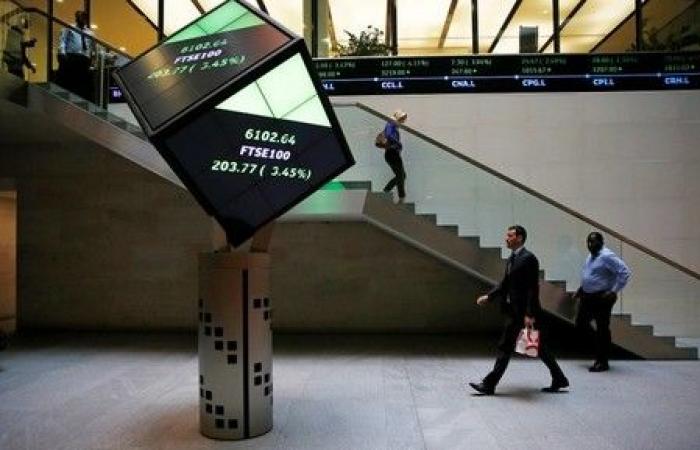(Alliance News) – The FTSE 100 closed lower on Friday, despite a bright start on Wall Street, hit by a fall in Diageo, the maker of Guinness, and weakness in housebuilders.
The FTSE 100 index ended down 36.11 points, or 0.4%, at 8,223.98. The FTSE 250 index lost 48.83 points, or 0.2%, to 20,591.40 points. In contrast, the AIM All-Share rose 1.70 points, or 0.2%, to 725.40.
Over the week, the FTSE 100 rose by 1.1%, the FTSE 250 by 0.2% and the AIM All-Share by 1.1%.
The Cboe UK 100 closed 0.4% lower at 824.67, the Cboe UK 250 fell 0.2% to 17,997.55, while the Cboe Small Companies fell 0.3% to 15 927.41.
In Paris, the CAC 40 fell 1.5%, while the Dax in Frankfurt fell 0.6%.
Shares of European wine and spirits makers were in the red after the US health minister demanded that alcoholic beverage labels carry cancer warnings.
Diageo, owner of Guinness and Johnnie Walker whisky, fell 3.7%, making it the worst performing stock on the FTSE 100.
Campari lost 5.2% in Milan, while Pernod Ricard, the world’s second-largest seller of wines and spirits, fell 3.1% in Paris.
The advisory from the U.S. Office of the Surgeon General describes scientific evidence linking alcohol consumption to an increased risk of at least seven different types of cancer.
The advisory says actions to reduce the number of alcohol-related cancers could include updating the existing health warning label on alcoholic beverages to include a warning about cancer risk associated with alcohol consumption.
Consideration could also be given to making label features more visible, more obvious and more effective in increasing awareness of the cancer risks associated with alcohol consumption.
“Health warning labels are well-established and effective approaches to raising awareness of health risks and encouraging behavior changes. Considerable evidence supports the use of health warning labels, including promising evidence regarding their role in raising awareness of the risks associated with alcohol”, we can read in the notice.
Contrary to the gloomy atmosphere prevailing in Europe, the American markets have progressed. In due course, the Dow Jones Industrial Average was up 0.6%, the S&P 500 was up 1.0%, and the Nasdaq Composite was up 1.4%.
Figures showed the U.S. manufacturing sector contracted at a slower pace in December.
The Institute for Supply Management’s manufacturing purchasing managers’ index rose to 49.3 in December, up from 48.4 in November.
“US manufacturing activity contracted again in December, but at a slower pace than in November. Demand showed signs of improvement, while output stabilized and inputs remained accommodative,” said Timothy Fiore, chairman of the ISM Manufacturing Survey Committee.
Thomas Ryan of Capital Economics noted that the headline figure rose to its highest level since March, “beating consensus and our own expectations that it would remain unchanged.”
He explains that this increase is due to significant gains in the production and new orders indices.
“The bottom line is that while manufacturing activity remains in the doldrums, the less gloomy recent survey data points to good times ahead,” he added.
The dollar gave up some ground after Thursday’s significant gains.
The pound was up at $1.2414 on Friday afternoon, up from $1.2378 at the close of local stock markets on Thursday.
The euro rose to 1.0297 USD from 1.0251 USD. Against the yen, the dollar was down at 157.33 yen from 157.63 yen.
On London’s FTSE 100, housebuilders were a weak spot after a surprise drop in mortgage approvals in November.
According to Bank of England data, net mortgage approvals for house purchases fell to 65,700 in November, from 68,100 in October. However, approvals remained above their 12-month average of 60,400.
The FXStreet consensus expected mortgage approvals to increase to 68,500.
Remortgage approvals fell to 31,200 in November from 31,500 in October, but remained above their previous 12-month average of 30,000.
Barratt Redrow fell 2.7%, Taylor Wimpey 2.4% and Persimmon 2.9%.
However, oil majors and index heavyweights Shell and BP remained in the green, up 1.7% and 1.6% respectively, as oil prices maintained their recent gains.
The barrel of Brent fell slightly to 76.33 USD on Friday afternoon, compared to 76.43 USD at the close of the London stock markets on Thursday. Gold fell to $2,641.67 an ounce from $2,657.49.
Retailers were mixed after a report showed footfall declined in December.
Total UK footfall fell 2.2% in the five weeks ending December 28 compared to 2023, according to BRC-Sensormatic data.
This is an improvement on the 4.5% drop recorded in November, although it reflects the useful time of Black Friday. This year’s December figure includes Black Friday, rather than the November figure, while the reverse was true in 2023.
Overall, UK attendance in 2024 fell by 2.2% compared to 2023.
Helen Dickinson, chief executive of the British Retail Consortium, said: “A lackluster December, which saw fewer customers in all locations, capped a disappointing year for UK retail footfall. that 2024 is the second consecutive year of falling footfall Main streets and shopping centers have been particularly hard hit throughout the year as people have turned to retail parks to take advantage of free parking. and the variety of department stores.
M&S rose 0.5%, but Next fell 1.8%.
Mr Mould, of AJ Bell, said the low attendance illustrated “how difficult life remains for the sector”.
“There is an increased risk of profit warnings in the retail sector over the coming weeks as management teams take a more realistic view of the year ahead. This is one of the main reasons behind a broker’s negative comment on Next, which caused its shares to fall.”
“Deutsche Bank fears that Next will give weaker forecasts than those currently expected by the market.”
“Next is the bellwether for the UK retail sector and anything it does to upset investors could negatively impact other retail stocks on the London market,” he added.
Elsewhere, British Land firmed 0.9% after positive comments from Morgan Stanley.
The broker believes that the European real estate sector should “recover if we were to see greater recognition of fundamentals”.
“There are risks at the macroeconomic level, but the risk reward appears compelling,” Morgan Stanley added.
She sees the “best opportunities” in the UK where “asset valuations have been revised downwards, demand is strong with limited availability, while balance sheets are strong”.
“In the short term, we see the greatest re-rating potential in British Land, Derwent London, Great Portland Estates and Land Securities, with a preference for British Land and Landsec as their high dividend yields mean investors are ‘paid to wait’.”
Tullow Oil shares jumped 11% after the International Chamber of Commerce ruled that the branch profits transfer tax was not applicable to the company in Ghana because it is not subject to the tax regime provided for in its oil agreements.
Following this decision, Tullow Ghana is not required to pay the USD 320 million BPRT assessment issued by the Ghana Revenue Authority.
Panmure Liberum’s Ashley Kelly said removing an additional bond “will reduce pressure on the strained balance sheet”.
Monday’s global economic agenda forecasts a series of composite PMIs. Later in the week, a series of US employment data will attract attention, culminating in Friday’s non-farm payrolls figures.
Next week the local business calendar will be dominated by Christmas statements from retailers Next, B&M European Value Retail, Marks & Spencer, Tesco and J Sainsbury. Shell will also provide an update on its activities on Wednesday.
By Jeremy Cutler, Alliance News reporter
Comments and questions to [email protected]
Copyright 2025 Alliance News Ltd. All rights reserved.






